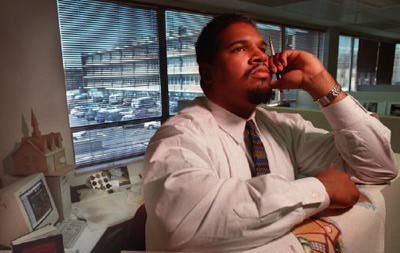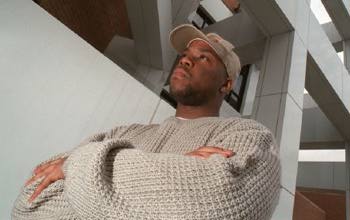
The Dream evolves
The children of baby boomers face different challenges, but race still matters.
 By Angela Townsend DAYTON DAILY NEWS
By Angela Townsend DAYTON DAILY NEWS
Published: Thursday, April 9, 1998
Series - Part 5
Derek Walker grew up with advantages his parents worked hard to provide for
him and his older brother.
He went to private schools - the Miami Valley School, then Archbishop
Alter High School - where he rarely saw other black kids in his classes. When
the time came to choose a college, he packed his bags and went to historically
black Hampton University in Virginia.
Throughout his life Walker, 27, has had the best of both worlds. He is a child of the children of the dream.
But the dream of equal opportunity doesn't look the same as it did for his parents. In Walker's lifetime, women and gays have used the theme to advance causes.
 Derek Walker, an associate architect at DNK Associates in
Cincinnati: `The dream was equal rights under the law, nothing more,
nothing less.'
Derek Walker, an associate architect at DNK Associates in
Cincinnati: `The dream was equal rights under the law, nothing more,
nothing less.' JIM WITMER / DAYTON DAILY NEWS |
Added Elizabeth Toledo, vice president/action of the National Organization for Women, "Certainly some of the major initiatives that came out of King's work and the 1964 Civil Rights Act really had a major benefit (to fight) sex discrimination."
The question now is how will young Americans, especially young black Americans, shape King's legacy in the 21st century. There is evidence that although young blacks believe in personal responsibility, they see the value of programs like affirmative action.
In a 1997 national opinion poll by the Washington D.C.-based Joint Center for Political and Economic Studies, blacks ages 18-25 felt more strongly than black baby boomers that blacks who can't get ahead in the United States are mostly responsible for their own condition. But when asked if every possible effort, including preferential treatment, should be made to improve the positions of blacks and other minority group members, almost 55 percent of those ages 18-25 surveyed agreed vs. 32 percent of blacks ages 36-50. That's with a statistical margin of error of 4 percentage points.
Disappointment in how King's legacy has evolved in the 1990s is palpable among some young people. They don't discount King's work; in fact, they praise it highly.
But they're not satisfied with the status quo.
`The dream was equal rights under the law, nothing more, nothing less,' said Walker, an associate architect at DNK Associates in Cincinnati. "I'm happy there have been large developments in terms of race relations, but I think the dream was missed."
It is not enough to be content with the fact that legally black people can live wherever they want, go to the college of their choice, and sit on the bus wherever they choose.
Said Andrea Snow, 28, of Dayton, a project coordinator with the Job Center, `We can do things now that we couldn't do when (King) was alive. But we still have work to do."
As Fred Burtz, 25, a senior economics major at Wright State University, said: "We're equal, but we're really not."
Old school vs. new school
The gulf between older and younger blacks on civil rights issues is widening, said David Bositis, senior political analyst for the Joint Center, the country's leading black research center. Younger blacks cannot relate to living in the segregated South or the inability to cast a ballot or the freedom marches."The fact is, among the younger generation of African Americans, the consciousness and the sense of significance of the civil rights movement is already lost," Bositis said. "All of the struggles associated with the civil rights movement, they're taken for granted."
At the same time, young people who aren't in the "comfort zone" of the suburbs, a two-parent home or corporate America, feel they're dealing with insurmountable challenges - AIDS, teen pregnancy, police brutality, poverty and the lack of jobs.
 Fred Burtz, a senior economics major at Wright State University:
`We're equal, but we're really not.'
Fred Burtz, a senior economics major at Wright State University:
`We're equal, but we're really not.'SKIP PETERSON/DAYTON DAILY NEWS |
In the past eight years, the NAACP, the nation's oldest and largest civil rights organization, has sought to boost its membership, primarily among younger people. The selection of former Maryland Rep. Kweisi Mfume as its national president in December 1995 was seen by many black Americans as a step in the right direction.
After his election, the National Association for the Advancement of Colored People adopted a new five-point agenda. One focus was a greater emphasis on youth recruitment to cultivate a new generation of leaders.
But the issue of who's a member and who isn't still remains a battle between the movement's creators and younger black Americans who, on average, have very little invested in the civil rights groups of old.
`Back in Dr. King's day, it was all about the organization,' said Kimberly Carter, 28, a senior community development specialist with the city of Dayton. `The organizations were more of a resource, more of a patriarch-type of a symbol." But now individuals deceive themselves, she said, into thinking they don't need organizations any more.
Rodgers doesn't think that way. He grew up watching his grandfather and an aunt play an active role in the NAACP in Cincinnati, and he wanted to emulate them. While in junior high school he joined the organization's youth group, broadening his awareness of the history that precipitated the civil rights movement.
Today at Wright State, Rodgers is involved with a Man to Man program that aims to unite black male students, who number 530 - or 3.3 percent - of the school's 16,000 students. He is also working with others to try to start an NAACP branch on campus.
Local civil rights organizations have attempted to bolster membership by including junior and senior high students in their activities.
Nikki Edwards has been a member of the Dayton Urban League's Youth Forum since summer. Before joining, Edwards, a senior at Miami Valley Career Technology Center, didn't know much about the Urban League. To her surprise, she found in the Youth Forum a group of teen-agers concerned about current events and challenges that still face black Americans.
`Just because we're young, that doesn't mean we can't make a difference,' Edwards, 18, said.
Edwards is confident that masses of people her age will someday be ready to play an active role in keeping King's legacy alive.
When that happens, the movement will take on a different look.
Walker said he believes the next generation of leaders won't come from the church, as did King or Jesse Jackson, or from politics, as did Barbara Jordan or Maxine Waters.
A member of the 1997-98 Urban League Black Leadership Development Program, Walker said he thinks the next generation of leaders will rise from business and industry.
Challenges to the legacy
And the force that could well drive people back to organized civil rights groups or compel the younger generation to pick up where their elders left off may be continued challenges to affirmative action, minority government contracts and other programs that were direct or indirect outgrowths of the civil rights movement.The most visible of those challenges has been the California Civil Rights Initiative, or Proposition 209, which passed in November 1996 and eliminated affirmative action in state hiring, contracts and the admission policies of public colleges and universities. Last fall the U.S. Supreme Court let the initiative stand.
The impact was immediate, and not just on black Americans. "Women contractors began to lose the ability to bid," said Toledo of NOW. "They weren't even in the loop, they weren't getting the notices. The same thing is now happening in Virginia."
Such talk of turning back the hands of time scares Snow. `It's even scarier when African American people are (talking about abolishing affirmative action), knowing that it has helped them get to where they are,' she said.
Edwards said those recent news events might be the spark needed to make younger people more passionate about becoming involved.
`Things are so integrated now, a lot of kids don't realize things that are still going on,' she said. `If we were more aware of some of the discrimination that was going on, there would be more of a concern."